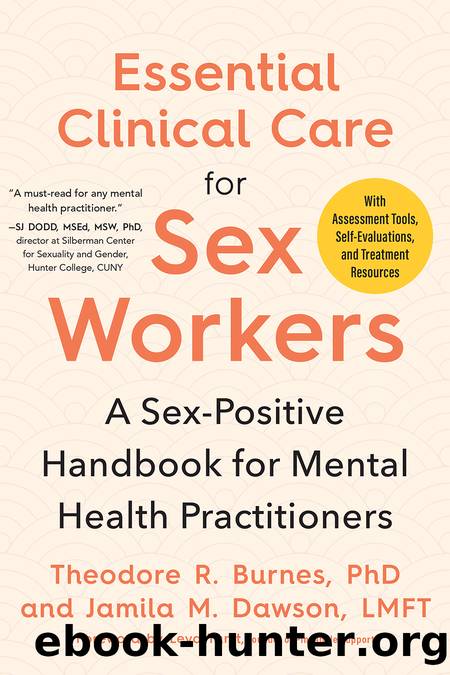Essential Clinical Care for Sex Workers by Theodore R. Burnes PhD & Jamila M. Dawson

Author:Theodore R. Burnes, PhD & Jamila M. Dawson [R. Burnes, Theodore & M. Dawson, Jamila]
Language: eng
Format: epub
ISBN: 9781623176815
Publisher: North Atlantic Books
Assessment Forms and Initial Paperwork
Many mental health workers have new clients and consumers with whom they work complete some necessary paperwork. As you begin the assessment phase, your assessment paperwork can be digital, or you can create a hard copy. We recommend that you be thoughtful and transparent about what is in your assessment paperwork, as the wording that you choose in your paperwork can communicate a lot to your clients about you and your comfort levels before the client ever meets with you (for specific ways that your biases might enter your wording on forms, we encourage you to revisit chapter 4). We encourage you to think about wording that you use that might indicate openness to clientsâ multiple partners, clients having partners of different sexes and genders, and clients being able to identify with multiple categories with regard to their sociocultural identities (e.g., clients having multiple ethnicities, occupations, jobs, etc.). One of our close colleagues loves to tell the story of the day that she realized that her intake paperwork asked the respondent to write about âa jobâ or âan occupation,â and that the minute she made these words plural (i.e., jobs, occupations), she learned a lot more about clients.
Being transparent about not only intake paperwork but also questions that you might ask during an interview can help to build trust with clients. It can also relieve stress on clients to give them all assessment paperwork beforehand so they can see some of the questions that you will be asking them. Another option can occur in session: You can have a list of questions in front of you that you want to ask and concurrently also give the client a copy of the same questions. Such transparency allows clients to review your questions and read along with you. Such transparency can be very helpful for establishing a sense of trust and mutuality. If you are a clinician who does not like to use lists of questions, a third option is to keep in mind the assessment questions that you want to ask and then gently weave those into your session time with the client.
When it comes to your assessment paperwork, just as with your intake paperwork, pay particular attention to create forms or other avenues of contact that are accessible and inviting, whether itâs an online form, an in-person form, or contact by phone or video conferencing. The language used in your intake should be inviting and helpful and should take their world into account. For example, this could mean having a variety of choices for gender. If you do ask for occupation, you can list not just sex work but you can list different types or kinds of sex work. You can give them options asking them what name they prefer to use. Some clients are going to want to use their stage/professional name; other clients are going to want to use their legal names or another name thatâs very meaningful to them. When you can, mindfully create space in your assessment to ask these questions.
Download
This site does not store any files on its server. We only index and link to content provided by other sites. Please contact the content providers to delete copyright contents if any and email us, we'll remove relevant links or contents immediately.
The Art of Thinking Clearly by Rolf Dobelli(8902)
The 5 Love Languages: The Secret to Love That Lasts by Gary Chapman(8576)
Mindhunter: Inside the FBI's Elite Serial Crime Unit by John E. Douglas & Mark Olshaker(7877)
Becoming Supernatural by Dr. Joe Dispenza(7144)
The Road Less Traveled by M. Scott Peck(6672)
Nudge - Improving Decisions about Health, Wealth, and Happiness by Thaler Sunstein(6669)
Enlightenment Now: The Case for Reason, Science, Humanism, and Progress by Steven Pinker(6436)
Win Bigly by Scott Adams(6345)
Mastermind: How to Think Like Sherlock Holmes by Maria Konnikova(6280)
The Way of Zen by Alan W. Watts(5830)
Factfulness: Ten Reasons We're Wrong About the World – and Why Things Are Better Than You Think by Hans Rosling(4045)
The State of Affairs by Esther Perel(3966)
Gerald's Game by Stephen King(3948)
Man's Search for Meaning by Viktor Frankl(3677)
The Confidence Code by Katty Kay(3599)
Thinking in Bets by Annie Duke(3556)
The Worm at the Core by Sheldon Solomon(2947)
Enlightenment Now by Steven Pinker(2934)
Liar's Poker by Michael Lewis(2834)
